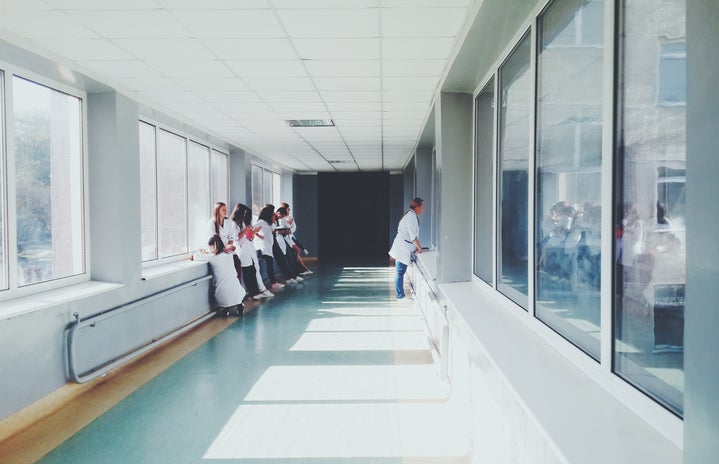Hi, my name is Jenna, and I live in constant pain. About a year-and-a-half ago, I woke up in the middle of the night in pure agony. The pain felt like Satan himself was tattooing my insides. The emergency room nurse couldn’t find anything wrong and recommended I do research on ‘Endometriosis.’ They sent me home, still in pain. I don’t fault her on that. With the opioid crisis going on, who would want to give pain medication to a 19-year-old with no physical symptoms?
I was terrified. This wasn’t the familiar tightness and pain that told me I had an ovarian cyst, and it wasn’t the same feeling I’d experienced with cramps. I’d been diagnosed with PCOS when I was 15 and always experienced heavy and painful periods. In high school, I routinely missed classes the first day of my period because I couldn’t function. Now, I am missing college classes, estimated at $90-$105 a pop, because I couldn’t move without crying, and sometimes the pain was so intense I vomited.
I chose to not see my gynecologist. She often refused to listen to me, and decided for me what was wrong, and what to do. I stopped seeking help after multiple ER visits with no results or testing and an unfortunate urgent care visit.
I was in so much pain that my significant other insisted I see someone. I started at our on-campus health center, and after my initial appointment, they recommended I go to an urgent care center or the ER because there was nothing they could do for me. I wanted to go back to my dorm room, curl up and cry until my pain stopped being an 8/10 and was back to a sufferable 5/10. My significant other insisted, and I thought maybe this time I’d be treated seriously and maybe even get some answers.
I was completely wrong. It felt like I was on trial as soon as I got in with the doctor. I told him I was there because I was in pain, and we started going over my medical history. When I told him I had PCOS he interrupted me, and actually laughed before telling me “PCOS had no pain,” which is completely untrue. I left feeling stupid, small and still in immense pain. My significant other took me home and kept me comfortable, but I was absolutely defeated. I made an appointment over Christmas break with my gynecologist.
I hoped, as another woman, she’d understand my frustration and finally let me be heard. Unfortunately, again, I was wrong. She asked me to show her where my pain was. I indicated my lower abdomen and pelvic area, and to my horror, she started poking, prodding and kneading my stomach roll.
As a plus-sized woman, I never indicated my fat roll in these situations because it held none of the areas where I was in pain. I tried to correct her, but she took my visible signs of discomfort as an affirmation of where my pain was, when the only pain was coming from her kneading my fat-cushioned intestines. She insisted that was too high in my body to be endometriosis, or anything covered in her field of medicine and urged me to see a gastroenterologist. I left with no answers and pain well within the realm of gynecological study.
This semester, I met with other women on campus who have fought to get their endometriosis diagnosed. My history of painful periods, painful PMS and pain that reached from those areas into my lower abdomen matched up to the symptoms of endometriosis. I even learned that endometriosis can be linked within families along with histories of infertility and how the pain can spread throughout the entire body as the endometrium spreads. This was devastating because it meant, despite the fact my gynecologist was wrong, that pain could’ve still been endometriosis, something well within her wheelhouse.
I’m trying to find a new gynecologist who will listen to me and advise me in pain management. For now, it’s just another instance of trying to receive medical care and being blocked because of assumptions: that I’m too young to have endometriosis and that my symptoms are empty grasps at narcotics. The same thing happened when I was a tween trying to get antidepressants and again when trying to treat my metabolic syndrome. I was too young to need medication; it could damage my liver if I was medicated for these chronic conditions and mental health issues. I’m not a stranger to fighting to be heard or fighting for the medical care I need. I just wish it wasn’t necessary.


